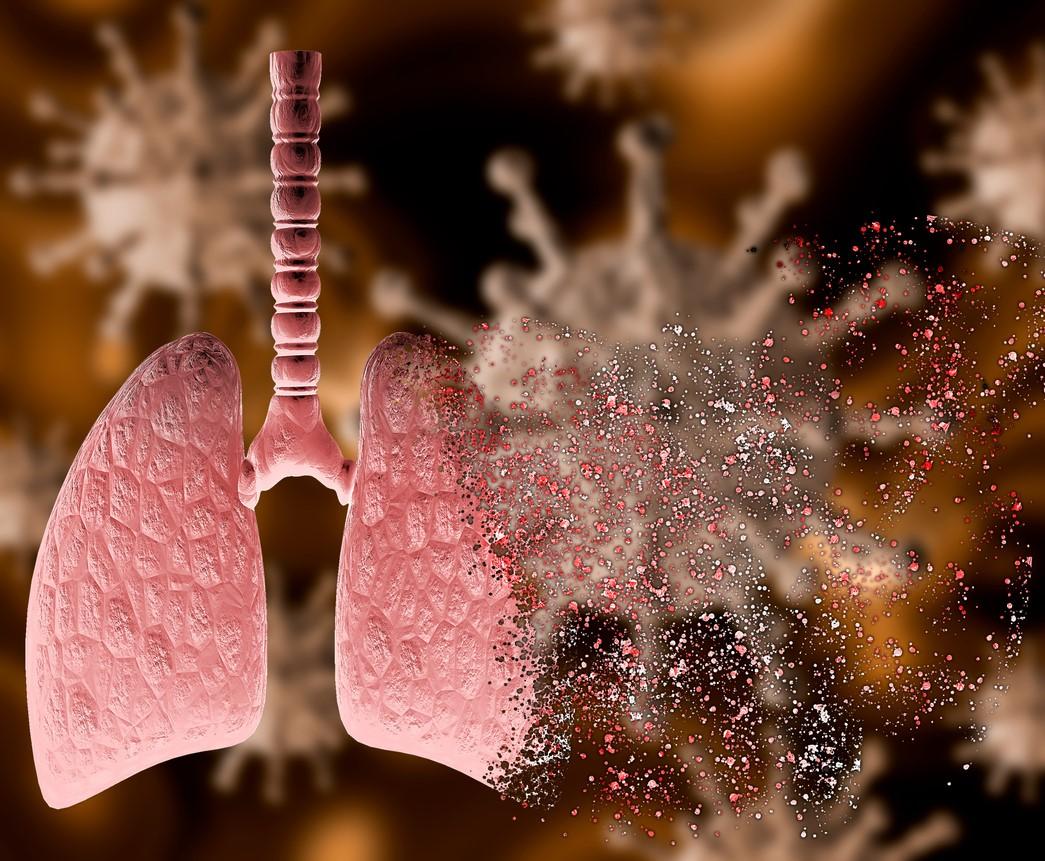In the first findings on how the Omicron variant (B11529) infects the respiratory tract, researchers from Hong Kong University (HKU) today reported that the virus multiplies 70 times faster in the bronchi than Delta and the original SARS-CoV-2 virus, which they said might explain why Omicron transmits faster.
In other developments, countries such as the United Kingdom and South Korea—both reporting Delta (B1617.2) and Omicron community spread—reported record daily highs for COVID-19 cases.
Lung replication isn't sole severity factor
For the respiratory tract study, HKU researchers used lung tissue samples to compare infection with the recent Omicron variant compared with Delta and the original virus from 2020. They said the study is under peer review for publication.
At 24 hours after infection, Omicron replication was 70 times higher than the other two viruses.
In a potential clue regarding lower severity, they found that Omicron replication was less efficient in deeper lung tissue—more than 10 times lower than the original virus.
In an HKU press release, Michael Chan Chi-wai, PhD, the study's principal investigator, emphasized that virus replication isn't the only driver of disease severity and that host immune response can also play a role, such as the immune system dysregulation that leads to cytokine storm.
He also said by infecting more people, a very infectious virus may cause more severe disease and death, even if the virus itself is less pathogenic. Considering earlier findings that Omicron can partially escape immunity from vaccination and past infection, the overall threat will likely be significant, Chan Chi-wai said.
Vaccines leave Omicron antibody gap
In another research development, a separate team from HKU reported yesterday in a preprint study that people who received two doses of either the Pfizer-BioNTech or China's Coronavac vaccine don't produce enough antibodies against Omicron.
To explore antibody response to Omicron, they used blood from people who had received both doses of one of the two vaccines. There were 25 people in each group. Besides Omicron, they also explored how well the serum antibodies neutralized the Alpha, (B117), Beta (B1351), and Delta variants.
Only 5 of the Pfizer recipients produced neutralizing antibodies against Omicron, translating to a 36- to 40-fold reduction compared with the original SARS-CoV-2 virus. None of the Coronavac recipients had enough antibodies to neutralize Omicron.
Researchers said the findings highlight a breakthrough infection risk in vaccinated people and those who had previous infections. They also said the results support the use of third vaccine doses, though it's not yet clear if a third dose of Coronavac will shore up the antibody response.
ECDC puts Omicron risk at 'very high'
In an updated risk assessment today, the European Centre for Disease Prevention and Control (ECDC) said modeling projections point to an imminent rapid spread of Omicron and that it will probably be the dominant variant in the first 2 months of 2022.
Echoing what the HKU lung tissue researchers said, the ECDC said even if severity is the same as or lower than Delta, exponential Omicron growth could outweigh any of those benefits. It said the threat of further spread and its impact on public health are very high.
And while vaccination is a key tool to battle the surges, there won't be enough time to address the immunization gaps that still exist.
Andrea Ammon, MD, PhD, the ECDC's director, said, "It is urgent that strong action is taken to reduce transmission and alleviate the heavy burden on health care systems and protect the most vulnerable in the coming months."
In another European development, the United Kingdom today reported a new daily high for COVID-19 cases, with nearly 79,000 new infections, along with 4,671 new Omicron cases, raising its total to 10,017.
In a briefing today, the country's prime minister, Boris Johnson, said cases in some areas are doubling in less than 2 days, according to the BBC. He said hospitalizations are already rising, up 10% over the past week, with levels in London up by nearly one third.
More global headlines
- In its latest weekly pandemic update, the World Health Organization (WHO) said yesterday that global cases and deaths declined last week, but Africa reported an 111% rise in cases. The Western Pacific region also reported a rise in cases, partly driven by a surge in South Korea, which reported another daily record high today.
- South Africa reported another daily record high for cases, with test positivity at 32.2%, down slightly from the 34.9% reported yesterday. Only 30% were reported from Gauteng province, the initial hot spot, with cases rising in other provinces, including KwaZulu-Natal (22%) and Western Cape (17%).
- The United Kingdom has removed 11 African nations from its travel red list, according to an update from the government.
- Globally, 80 countries have reported 10,160 Omicron cases, according to a daily update from the ECDC. Some of the countries that have reported their first cases include Rwanda and Kenya, as well as the Philippines.
- Overall, the global COVID-19 total is at 272,015,695 cases and 5,327,069 deaths, according to the Johns Hopkins online dashboard.























